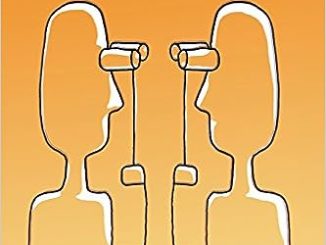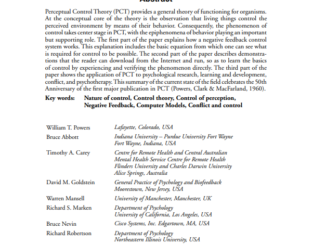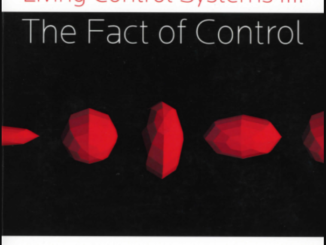
Heather Bell´s PCT simulation of distance control in rival animals
Heather C. Bell, Greg D. Bell, […], and Sergio M. Pellis (2015) https://journals.sagepub.com/doi/full/10.1177/1059712315607606

Heather C. Bell, Greg D. Bell, […], and Sergio M. Pellis (2015) https://journals.sagepub.com/doi/full/10.1177/1059712315607606

Richard S. Marken (2014) The core of the book are six papers by Dr. Richard S. Marken which have been published in peer reviewed journals over the past decade explaining why Perceptual Control Theory (PCT) […]

Henry H. Yin

Timothy A. Carey (2013) Article Link: https://www.thelancet.com/journals/lancet/article/PIIS0140-6736(13)62214-X/fulltext Article Info Publication History Published: 26 October 2013 Identification DOI: https://doi.org/10.1016/S0140-6736(13)62214-X Copyright © 2013 Elsevier Ltd. All rights reserved. ScienceDirect Access this article on ScienceDirect

Avraham Saig,* Goren Gordon,* Eldad Assa, Amos Arieli, and Ehud Ahissar 14022 • The Journal of Neuroscience, October 3, 2012 • 32(40):14022–14032 https://www.jneurosci.org/content/32/40/14022.short

Assembled by Sarah Alsawy & Warren Mansell (August 2012) Historical and Philosophical Context lntegrative & Transdiagnostic Theoretical articles PCT, Core Processes, Goal Conflict and Mental Health – Research Studies Method of Levels – lntroductory articles […]

William T. Powers, Bruce Abbott, Timothy A. Carey, David M. Goldstein, Warren Mansell, Richard S. Marken, Bruce Nevin, Richard Robertson, & Martin Taylor (2011)

Hello, all — Attached is a nice article by Fred Nichols (http://www.nickols.us/ManageYOP.pdf) who is a management consultant and a long-time CSG (control system group) member. It has a bearing on the difference between ACT (Steve […]

`‘EUREKA!’ Published on PCTweb 20th June 2011

An introduction to Perceptual Control Theory, contrasting it with basic ideas in contemporary science of psychology. […]

William T. Powers (2011)

Book + demonstration programs by William T. Powers (2008) Living Control Systems III continues Powers’ revolutionary approach to understanding living organisms as purposeful agents whose actions serve to control their environments. A unique feature of […]

Mathew E. Diamond, and Ehud Ahissar Open Archive DOI:https://doi.org/10.1016/j.neuron.2007.11.006 https://www.cell.com/neuron/fulltext/S0896-6273(07)00871-9?_returnURL=https%3A%2F%2Flinkinghub.elsevier.com%2Fretrieve%2Fpii%2FS0896627307008719%3Fshowall%3Dtrue

GARY A. CZIKO (2001) Teacher Adoption of Technology: A Perceptual Control Theory Perspective.

SCICOS – A dynamic system builder and simulator Wolfgang Zocher

A PCT Model of Human Oculomotor ControlPart 1: Basic Outlines Wolfgang Zocher

Towards a control model of object recognition R.Young and J. Illingworth

Control of a multi-legged robot based on hierarchical PCT Richard Kennaway

An experiment with a simple method for controlling an invertedpendulum William T. Powers

William T. Powers Proceedings of the 1st European Workshop on Perceptual Control TheoryGregynog, The University of Wales23rd – 27th June 1994

DEVIL’S .BIB Misunderstandings and distortions. See DISPUTE.PCT Unedited posts from archives of CSG-L (see INTROCSG.NET): This thread deals with myths, misunderstandings, and distortions offeedback, cybernetics and PCT. The term Devil’s Bibliography was suggested and stuck. […]

Raymond Pavloski (1989) https://doi.org/10.1111/j.1469-8986.1989.tb01953.x

A. R. Cools
Copyright © 2022 iapct.org